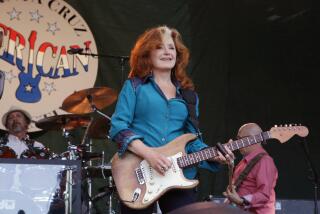Keith Richards reflects on the Rolling Stones’ BBC recordings, complete with threats of decapitation
- Share via
For all the outward swagger the Rolling Stones projected, there were certain situations that could intimidate even England’s bad boys of rock ’n’ roll.
Near the top of the list: performing before a TV or radio audience of millions of listeners, such as when the BBC extended an invite to appear on one of its many music programs of the mid-1960s.
For the record:
9:30 p.m. Dec. 11, 2017An earlier version of this post described “It’s All Over Now” as one of the band’s original songs. It was written by Bobby and Shirley Jean Womack.
“At the time we were doing this, we were, like, ‘Oh, my God — the BBC!’ ” Stones songwriter and guitarist Keith Richards, 73, said recently from his home in Connecticut, where he’d just returned after having wrapped a tour of Europe with bandmates Mick Jagger, drummer Charlie Watts, lead guitarist Ron Wood and bassist Darryl Jones.
That period is captured in “On Air,” a new two-CD, 32-track set out today and featuring recordings live and in the studio that the Stones made from 1963 to 1965.
See the most-read stories in Entertainment this hour »
“We were just trying to disguise our actual terror,” Richards said with that signature hearty pirate laugh. “There was a lot of adrenaline.”
The nerves, however, didn’t last long.
“Once you got out there — that’s the thing about the Rolling Stones,” he said, sounding one step removed from the group he’s been part of for 55 years. “Once we started playing, we didn’t give a [damn]. They still don’t — bless their hearts. We just got off the road, and I wish there were a few more shows. We were just hitting a groove!”
The Stones’ hard-hitting groove is front and center in many of the “On Air” tracks. The set includes such cornerstone songs from its early years as “(I Can’t Get No) Satisfaction,” “The Last Time,” “It’s All Over Now” and “The Spider and the Fly,” as well as blues and R&B chestnuts that had been important parts of the band’s repertoire before the Jagger-Richards songwriting team fully kicked into gear.
In those days, the BBC refused to play studio recordings by musicians that were spotlighted on various programs. Instead, the British government-run broadcast service insisted that artists record different versions for TV and radio, or perform them live. By contrast, many music shows in the U.S. often got by on the cheap by having performers lip-sync to their records.
The upshot is that the BBC created a trove of alternate studio and live versions of some of the biggest hits of the ’60s, including renditions of some songs groups never otherwise committed to vinyl in the day.
“On Air” provides a counterpart to two volumes of similar, already released BBC recordings the Beatles made during the same period. Along with the original material chosen for “On Air,” we hear the Stones’ take on Chuck Berry’s “Roll Over Beethoven” — one of the few times listeners can compare songs recorded by the Beatles and the Stones.
“The BBC wanted us and we didn’t know really why or what we were doing,” Richards said. “We were playing blues in bars, for Christ’s sake, but then we got a top 10 record and suddenly we’re the other alternative to the Beatles, bless their hearts,” he said. “Yeah, I mean, they broke the doors down, especially Johnny. We always got along.”
The set also features spirited versions of Berry’s “Memphis Tennessee” and “Carol,” Tommy Tucker’s “Hi-Heel Sneakers,” Buster Brown’s “Fannie Mae,” Hank Snow by way of Ray Charles’ “I’m Moving On,” Bo Diddley’s “Cops and Robbers,” Jay McShann’s “Confessin’ the Blues,” Rufus Thomas’ “Walkin’ the Dog” and Willie Dixon’s “I Just Want to Make Love to You,” best known via Muddy Waters’ recording.
“When I hear it, I hear a lot of energy and enthusiasm — and then I want to go in and remix it,” Richards said, laughing again. “But there was no remixing done then.”
One eye-opener for the young musicians was the peek they got behind the curtain.
“You think — you believe, the way you’re brought up in London — that the BBC know what they’re doing,” he said. “Then you get there and find out they have no idea how to record a band like this.
“The first thing I remember about my encounter with the BBC was there was this guy: Microphone Control Man. He had a huge mustache, like an officer in the RAF [Royal Air Force], one of them ginger jobs. He told me, ‘If you touch that microphone, I’ll decapitate you.’ I didn’t know what I would do with it anyway, but he had no more idea what to do with it than we did.”
Nevertheless, while the quality of the “On Air” recordings varies considerably, and some are monaural while others are stereo, many sound remarkably crisp, clean and potent. Some of that is attributed to an “audio source separation” process that Abbey Road Studio engineers used to bring more fidelity out of the original BBC tapes.
“On those shows,” he said, “you had no idea what the microphones were picking up and what was actually coming out of the radio. You just winged it and hoped for the best. Listening to it now, I think they captured the spirit of it all. I could argue about whether Brian was too loud or not, but apart from [stuff] like that, I think it’s a fascinating record as a piece.”
Yet, Richards said, “For me it’s hard to imagine people want to listen to BBC live recordings of the Stones from 1964 or ’5 or ’3 or whatever it was,” he said. “What I can say is I’m amazed there is so much interest in it. And that you people in America know more about it than we do.”
Indeed, “On Air” constitutes something of a companion piece, or a bookend, to last year’s “Blue & Lonesome” album, the Stones’ homage to vintage American blues, R&B and soul music that collected a Grammy Award nomination for traditional blues album.
“I’m really happy with the last album, the blues album,” he said. “It was one of the things we felt we had to do, but it worked out really great.”
Does that mean we might see a sequel one day soon?
“We’re working on some new [material] now,” he said. “There’s a new album in the works. We’re slowly putting it together.”
As for another modern-day collection of their favorite old blues numbers, Richards uttered another lascivious laugh and said, “I’m going to sound like Trump now: ‘Trust me. We’re working on it.’”
Follow @RandyLewis2 on Twitter.com
For Classic Rock coverage, join us on Facebook
More to Read
The biggest entertainment stories
Get our big stories about Hollywood, film, television, music, arts, culture and more right in your inbox as soon as they publish.
You may occasionally receive promotional content from the Los Angeles Times.










